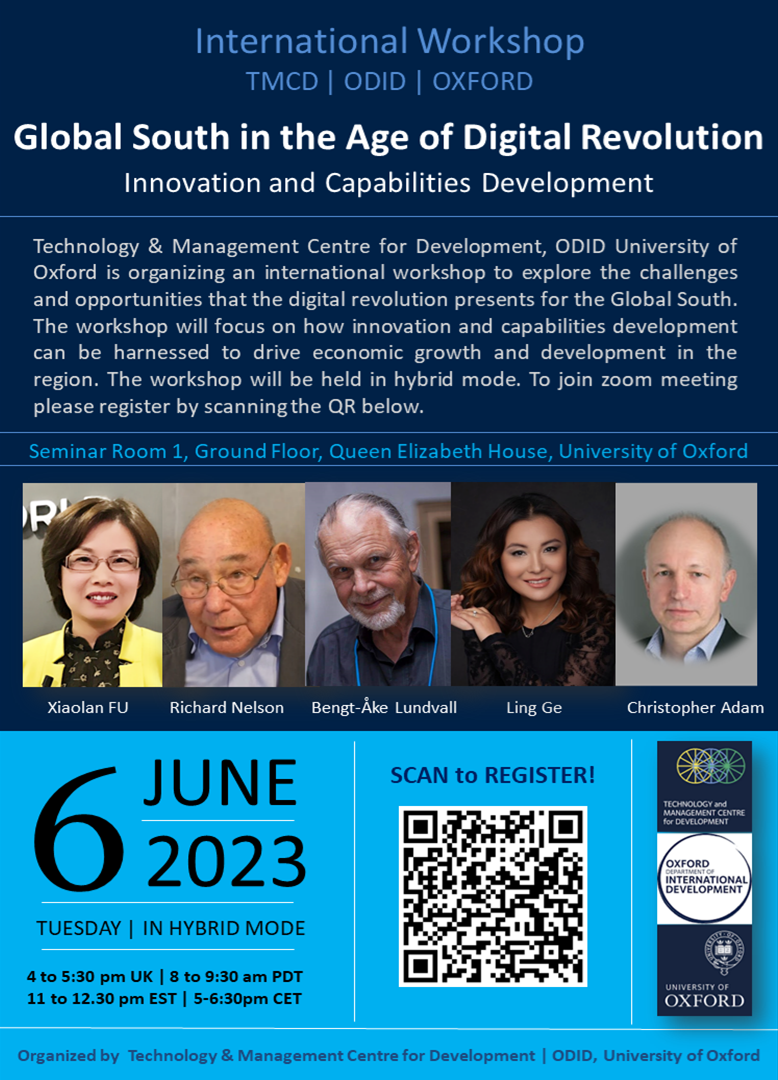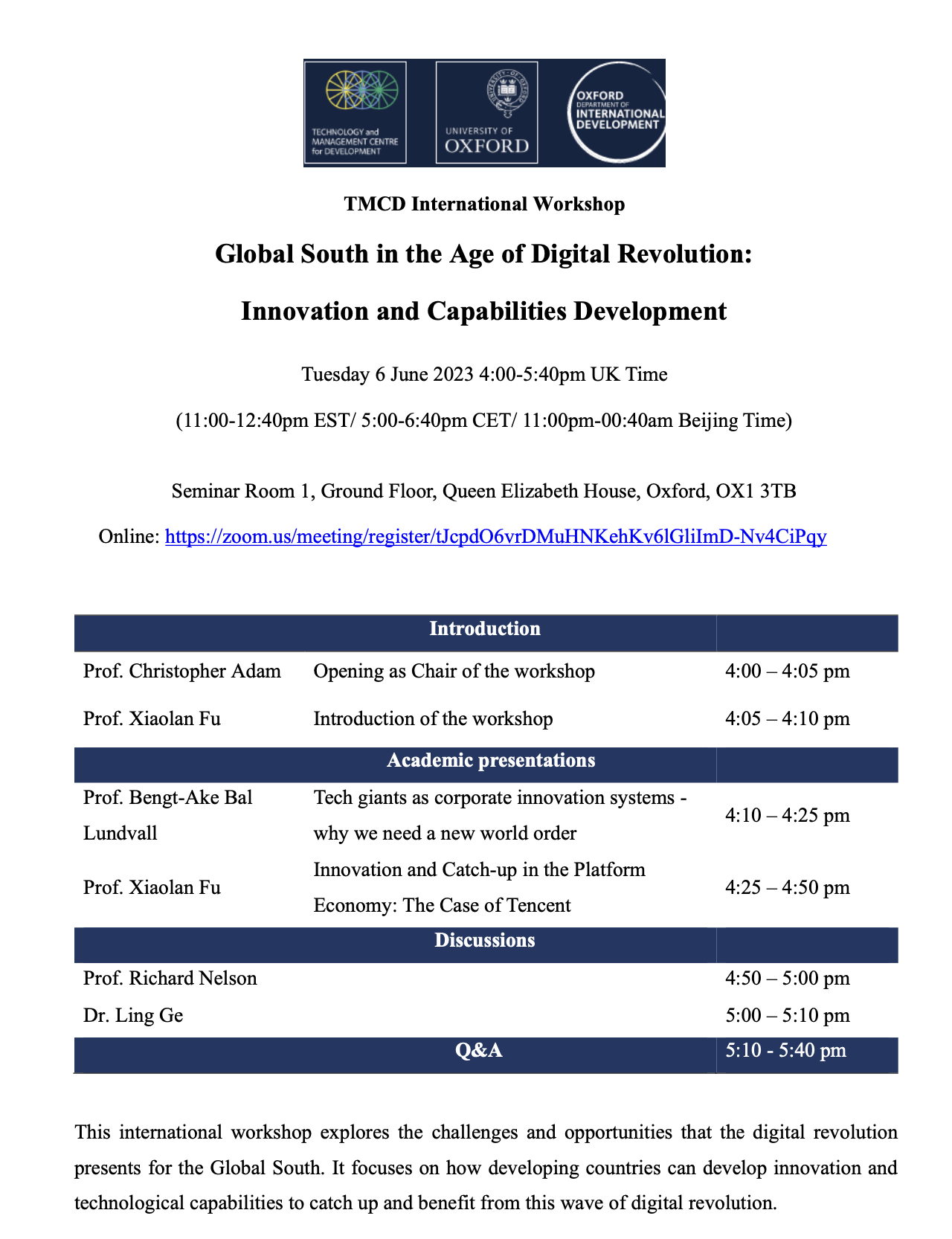Event details
International Workshop-Global South in the Age of Digital Revolution: Innovation and Capabilities Development
We are delighted to announce that an international workshop on “Global South in the Age of Digital Revolution: Innovation and Capabilities Development” will be hosted by the Technology and Management Centre for Development (TMCD) at the University of Oxford on 6th June, Tuesday, 2023 (4-5:30pm UK Time) in hybrid model.
We have the great privilege to have Professors Richard Nelson, Bengt-Ake Bal Lundvall, Xiaolan Fu and Dr Ling Ge to speak at the workshop. The event will be chaired by Professor Christopher Adam, Head of Oxford Department of International Development (ODID).
The international workshop will explore the challenges and opportunities that the digital revolution presents for the Global South. It will focus on how developing countries can develop innovation and technological capabilities to catch-up and benefit from this wave of digital revolution.
We cordially invite your participation in this international workshop. You are welcome to join us in person at Seminar Room 1 on the Ground Floor in Queen Elizabeth House, the University of Oxford. To join Zoom meeting please register by scanning the QR below or register here .
*This workshop will also be livestreamed here
*Please noticed that this session will be recorded.


Speaker Biography (in alphabetical order):
Prof. Xiaolan Fu, Professor of Technology and International Development; Founding Director of TMCD, University of Oxford
Xiaolan Fu is the Founding Director of the Technology and Management Centre for Development, Professor of Technology and International Development at the University of Oxford, and a Fellow of the Academy of Social Sciences. She is currently Director of Research of Oxford Department of International Development at the University, and also the Founder of OxValue.ai.
Her research interests include innovation, technology and industrialisation; trade, foreign direct investment and economic development; and emerging Asian economies. She is appointed by the Secretary-General of United Nations to the Governing Council of the Technology Bank for the Least Developed the Counties and to the Ten-Member High Level Advisory Group of the UN Technology Facilitation Mechanism. She is a winner of 2021 Falling Walls Scientific Breakthrough Award.
She has published extensively in leading international journals. Her recent books include Oxford Handbook of China Innovation (2022), Innovation Under the Radar: The Nature and Source of Innovation in Africa (2020), China’s Path to Innovation (2015), China’s Role in Global Economic Recovery (2011), and The Rise of Technological Power in the South (2010).
Dr. Ling Ge, Chief European Representative and General Manager, Tencent
Dr. Ling Ge is General Manager and Chief European Representative at Tencent, where she leads the company’s strategic investment efforts in Europe, along with the development of partnerships with technology start-ups, universities, government and industry.
She also serves on the boards of several venture capital and technology firms, providing expertise in areas such as AI, quantum computing, biotech, and education. Prior to Tencent, Ling held various leadership roles at Imperial College London. Ling received her doctorate in Quantum Computing at Oxford University and was a Leverhulme Fellow.
Dr Ge was named one of London’s top 10 most influential tech titans by the Evening Standard in 2019 and was recognised as ‘Leading Investor of the Year’ by Global Corporate Venturing.
Prof. Bengt-Åke Lundvall, Emeritus Professor in Economics, Aalborg University Business School
He graduated in economics at University of Gothenburg, Sweden 1966 and 1973-74 he was involved in the founding of Aalborg University, Denmark and in establishing the economics program there.
While leading the MIKE project on the impact of microelectronics on the Danish economy in the early 1980s, he was inspired to pursue research on product innovation as an outcome of interactive learning between users and producers. 1n that period he met Christopher Freeman, founder of SPRU, and together they developed the concept National Innovation System. 1992-95 he served as deputy director at the OECD Directorate for Science, Technology, and Industry.
He has had an intellectually prolific career. His contributions encompass a broad spectrum of scholarly output and institution building such as the PIKE-project on productivity paradox of Danish economy, and his work on long waves (1988-91), the concept of learning economy in 1992, the DISKO project on Danish Innovation System in 1995, coordination of Danish Research Unit for Industrial Dynamics (DRUID) during 1995-2000, the Lisbon strategy in the late 1990s, founding of GLOBELICS in 2001 - focussing on developing countries, research on Chinese economy and teaching at Tsinghua University since 2003. Recently he has done research on global value chains and on impact of digital revolution on the world order.
His major contributions are collected in ‘The Learning Economy and the Economics of Hope’ published by Anthem Press 2016.
Prof. Richard Nelson, George Blumenthal Professor Emeritus of International and Public Affairs, Business, and Law; Director of the Program on Science, Technology and Global Development at the Earth Institute, Columbia University
In a scholarly career spanning nearly seventy years Dick Nelson has spawned an impressive and influential body of intellectual output while working at various organisations including the RAND corporation, Council of Economic Advisors, Yale University, Columbia University.
He has written landmark pieces on evolutionary theory, technological change, economic growth, innovation systems, institutions and more broadly in understanding the economy as a complex evolving system. His landmark book, co-authored with Sydney Winter, ‘An evolutionary theory of economic change’, has become the foundation of the evolutionary approach to innovation, the firm, the capability approach, industrial transformation, and economic change.
Dick contributed to create a ‘visible college’ of scholars that share a common view in understanding the economy and share an evolutionary view of change and economic progress. A very interdisciplinary scholar, Dick has a wide and broad reading and understanding of a multiplicity of disciplines from biology to history to political sciences, sociology, technology and many other.
Many consider Dick as a social entrepreneur, a tenet he shares with Chris Freeman, his friend, long-term collaborator, and mentor. His ability to organise and manage efficiently large number of heterogenous scholars and unique ability to interact and work together with people from diverse fields and disciplines have resulted in very important books and outcomes. For example, the project at Institute of Social and Policy Studies produced the book on National Systems of Innovation; the Project on Industries became the book on Sources of Industrial Leadership; the Project on catchup became the book on Economic development as a Learning process.
Chair:
Prof. Christopher Adam, Professor of Development Economics; Acting Head of Oxford Department of International Development, University of Oxford
Christopher Adam's research is on the macroeconomics of low-income countries, in particular those of Africa, with a focus on monetary economics and public finance; and growth and structural change in low-income countries, including in response to climate change and natural disasters. His work uses methods of quantitative macroeconomics including stochastic and deterministic general equilibrium techniques.
Christopher Adam is a Visiting Scholar at the International Monetary Fund (IMF) as a member of the FCDO-IMF research program on the macroeconomics of low-income countries; an advisor Lead Academic for the International Growth Centre (IGC); and an advisor to the Monetary and Economics Department of the Bank of International Settlements (BIS).
From 2003-05 he served as external Macroeconomic Adviser to the Policy Division at the Department for International Development (DFID) and represented DFID as Vice Chair of the African Economic Research Consortium from 2006 to 2016. In 2011-12 he served as Special Advisor to the House of Lords Economic Affairs Committee Inquiry into Aid Effectiveness.
Please find slides for this workshop here


